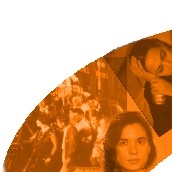


| Course M, 2:30-5:20 W, 2:30-4:20 Thomson 125 |
| Instructor K. Gillis-Bridges Padelford A305 543-4892 MW, 1:00-2:20 |
| Page last updated 12/9/02 |

Sample Essay
Becoming
Cleo From 5 to 7 and Clueless are two films in which the lead female characters experience life-altering transformations. Cleo and Cher are vanity-obsessed women who judge their value and self worth through their looks and material possessions, focusing on themselves as the object of their gaze. Agnes Varda, director of Cleo From 5 to 7, uses the narcissism and vanity of her lead character to create someone whom the audiences dislikes in the beginning of the film, but grows to love in the end. Amy Heckerling uses Cher’s vanity and narcissistic qualities in a more comedic light, creating a character that is completely clueless but ultimately likeable. Towards the end of the films, the idea of vanity begins to fade away and is replaced with the idea of a man--a man who contributes to the two characters' personal revolutions. It is this final makeover, and the ending of each movie that helps to restore their credibility from a vain and narcissistic female to a more respectable woman, no longer obsessed herself. In the transformation from a narcissistic female to a “new” person, both Cleo and Cher are influenced largely by their male associates, and ironically the transformations which help to restore their credibility and likeability also destroy it simultaneously, as each character becomes the object of the male gaze.
Vanity is used in the two films as a way of describing and creating the idea of femininity, but is used differently by both directors. Varda utilizes mirrors to convey Cleo’s vanity; she constantly is shown looking in mirrors as she attempts to prove to herself that she is beautiful and others envy her beauty. In one of her many voice- overs, Cleo sates “Being ugly, that’s what death is. As long as I am beautiful, I’m alive, and ten times more than the others.” Varda also shows Cleo shopping for a new hat, in which she has total disregard for the store as she tosses hats wherever she pleases. In essence, she looks like a spoiled brat. During the shopping scene, Cleo is completely unaware of the outside scene which is bustling with people, and only focuses on her own image, thinking “Everything suits me; ah, I could be intoxicated trying on hats and dresses”. This example of narcissism causes the audience to have a dislike towards Cleo, especially among women. Already dealing with a stereotype that many women are obsessed with themselves and their looks, the idea of Cleo’s vanity as a description of her femininity is insulting.
Heckerling, on the other hand, uses vanity along with the cluelessness of Cher to create a more likeable character. In the beginning scenes of the movie, Cher says “But seriously, I actually have a way normal life for a teenage girl.” And them proceed to describe her morning ritual, like picking out her clothes. Her closet-in-a-computer program is shown and is anything but normal. She has so many clothes that she must use a computer to pick out her outfits and tell her if she matches. Just as Varda uses mirrors, the computer can be seen as a direct correlation for the portrayal of vanity in Clueless. The shopping mall is also important in defining the idea of Cher’s narcissism, and she spends so much time there that when Josh sees Cher he comments “Who’s watching the galleria?” As Gayle Wald argues, shopping is used as “…a sign through which they’re gendered…” (229). Fellow classmate Holly Evanoff states “The female characters are “feminized to the max” in the movie; they go shopping, care only about their looks, pretend that they are smart and know what they are talking about (when they really don’t… ie: speech), and go to school only to socialize.” Shopping and its relation to vanity are used to emphasize the girls, and in particular Cher’s femininity. In the first half of both films, Cleo is seen are more self-absorbed than Cher. Cleo has a total disregard for others in her obsession with herself, while Cher is more involved in others lives, however displaced this may be. Cher decides to help Tai fit in at their high school, and does so by giving her a makeover so that she will look more like the other kids. Comedy through the idea of cluelessness is used in this film to create a character that is hard to dislike. She is so ignorant and naïve about certain subjects that one cannot help but feel sorry for her character rather than having an acute dislike for her.
The point in which each character begins to travel down the path of recreating their selves on a more spiritual level is easily distinguishable in each film. Male influence is also apparent and is what influences both Cleo and Cher to go though their respective makeovers. In Cleo from 5 to 7, Cleo sings a song titled “Cry of Love” and comes to the realization that she is so self involved that she lacks any meaningful understanding of others. During the scene, a full orchestra begins to play what was once piano music, and Cleo is pictured against a black background with theatrical lighting, drawing attention to the scene as one that is a critical turning point in the film. Additionally, an essential point of this scene lies within the dialogue between Cleo and the two men who write and compose her songs. Cleo gets angry at the fact that the men with whom she works think of her as only a slightly talented and capricious pretty little girl. As Sandy Flitterman-Lewis states in her article, “In effect, Cleo explodes in rage at her songwriters, rebelling against the image they have constructed for her: ‘You didn’t teach me the solfeggio just so that you could make me dependent on you. Everybody spoils me, nobody loves me’” (201). While the song clearly assists Cleo in her realization, she is also strongly influenced and motivated to change because of the way men construct her. Cher’s revolution in Clueless occurs after she has horrible day; she fails her driving test and is then upset because Tai is interested in Josh. After a few hours on Rodeo Drive, doing what Cher does best--shopping--she stops short and realizes that she is in love with Josh. Heckerling uses colorful lights and a fountain as scenery during Cher’s revolutionary discovery, emphasizing this scene as an important one. Because Cher sees Josh as someone who is far more intellectual than she is, she begins to make attempts to become less self-involved. Throughout the film Josh makes several suggestions about how Cher should use her popularity to do some good. Josh, and his ideas of what a person should be affect Cher in her quest to become a better person.
Voiceovers are a common theme in both of the films. In Clueless, the voiceovers are only from Cher’s perspective. In a voice-over after her major realization, Cher says, “I decided I needed a complete makeover. Except this time I would makeover my soul.” Cher chooses to move away from her vain tendencies in order to make herself a better person, all because of her love for Josh. Voiceovers in Cleo from 5 to 7 come from more than just Cleo’s perspective, though she too includes the audience in her important thoughts about her transformation process. Once again shown looking in a mirror, Cleo says “This doll’s face, always the same. And this ridiculous hat. I can’t even read my own fear on my face. I’ve always thought everyone was looking at me, and I only look at myself. It’s tiring.” Cleo has finally become aware that the world does not revolve around her alone, and moves away from defining herself and her femininity in terms of vanity and towards looking and caring about other people.
Both Cher and Cleo are largely influenced to change their inner selves as a result of patriarchal influence, however the ways in which each character proceeds with the process are very different. Cleo spends a considerable amount of time with other people as she explores her inner-self, while Cher participates in activities that will impress Josh. Once Cher decides to “…makeover my soul.” she throws herself into the Pismo Beach disaster relief drive at her school. She also takes a sudden interest in news, all due to the ideas that Josh has inflicted on her. Suddenly, Cher becomes a more likeable character. Gayle Wald writes, “The film wants viewers to applaud Cher’s transformation by contrasting her behavior in the mall…with her behavior around Josh, where she is noticeably more self-conscious and self-critical” (232). Cher remains clueless--she donates caviar and athletic equipment to the disaster drive, yet she is making a strong effort to move from her narcissistic tendencies. Cleo’s transformation from a narcissistic doll to a more aware being is quite different than Cher’s. Before going to walk around Paris, she storms behind her black curtain and changes her clothing. She also rips off her wig and leaves the apartment with her natural hair, strongly signifying the transition from vain and narcissistic to something more likeable; a stronger woman who is interested in others. Cleo embarks on a journey in which she spends a decent amount of time with herself, looking at others and reflecting on how little she knows about others. By spending time with Dorothee, who is confident about her body and poses as a nude model but does not feel that her identity as a woman is defined by how beautiful people thinks she is, Cleo is shown that being beautiful is not as important as she previously thought (Flitterman-Lewis 201). Cleo also spends a substantial amount of time with Antoine, in which the audience sees her interact with a male on grounds other than trying to impress him with her looks. Antoine is unlike any of the other men in the film, and showers Cleo with the kind of affection she had been craving. Engaged in real discussion with Antoine, Cleo admits that “Today everything amazes me. The faces of people and mine along-side them.” With this line, Cleo instantly becomes a character that is received by the audience in a positive light. Cleo had previously had conversations with other men, and her makeover was inspired by male influence, yet this is the first deep and meaningful conversation she was with a male in the film. The audience is finally able to relate to a character which portrays positive qualities, such as caring about others and their ideas.
Through each makeover, the women become people whom the viewers can respect and who are considered more respectable by societal norms. Vanity and obsession with material objects are two qualities that society frowns upon because it creates people who think they are superior to others. Vanity and narcissism are used to define femininity in the two films. Ironically, society, and specifically women, have a dislike for women who posses the extremes of the qualities--yet they are still used identify and portray gender. Each character becomes more likeable as they undergo their transformations away from their previous self-absorbed tendencies. The increase of likeability can be viewed through the idea of the women becoming the object of the male gaze. Clueless has a fairytale ending. In the beginning of the film Cher’s main focus was to find a person for Tai to be with, even though she herself was lonely. After struggling with falling for a gay man, Cher is finally able to be truly happy when she discovers Josh reciprocates her feelings. Audiences enjoy being entertained, and romanticism is the perfect avenue, especially with a “happy” ending. Cleo also has troubles with her love life in the early part of the film. She is in love with a man whom she never gets to spend quality time with and who has little regard for her thoughts and opinions. Upon meeting Antoine, she is finally able to connect with a male on a multifaceted level, and this contributes to her likeability because it is a positive aspect of her transformation process. Although the women’s process of becoming subjects of the male gaze does create some likeability for the characters, the process also establishes problems.
Both Cleo and Cher are re-created into women whose lives take on a deeper meaning. While these ideas garner credibility for their characters, they are also problematic in a more feminist sense in that they return the women to the male gaze. The endings in each movie pair the women with men. Varda’s final shot for Cleo from 5 to 7 shows Cleo and Antoine staring into each other’s eyes. Such an ambiguous ending leaves room for audience interpretation. One may think that the next seen would show them embracing and kissing, and another might view their relationship as strictly platonic. Nonetheless, Cleo was inspired by the idea of the male gaze to undergo her life transformation and is altered from gazing at herself, to becoming the object of the male gaze. Heckerling ends her film by showing Cher and Josh embracing and kissing. Much less ambiguous than Varda’s ending, this scene completes a fairytale story. Cleo began her makeover because of how men in general viewed her, and Cher decided to change herself solely because she was in love with Josh. Cher’s makeover is not less important because she still becomes a person who is less self-involved. However, when looked at in terms of traditional feminism, Cher and Cleo’s change to the object of the male gaze poses questions about the motivations of such changes. Should the women change in order to please men? And if they do, can the change be considered as satisfying as changing purely because of their own desires?
Ally Acker quotes Varda as saying that “’feminism must encompass all women, even those who choose to stay home and in the kitchen and do their changes from there. At home is where they are most important. We need all kinds of women in films, because there are all kinds of women’” (183). Narcissism may be a less desirable quality than selfish devotion to helping others, but as Varda says there all types of women. Cleo and Cher are representative of these types of women, and although their vain tendencies are used to define their femininity, they also break away from such a stereotype and are shown as possessing more positive qualities. Each character becomes the subject of the male gaze in the end of the film, and while some may view this as problematic, others could view it as the opposite. Some women dream of being the subject of the male gaze, and who can say that this measures whether they are strong and respectable women?
Copyright 2002 Cristina Brendicke
Essay may not be reproduced in any form without
the express permission of the author.
Essay may not be reproduced in any form without
the express permission of the author.